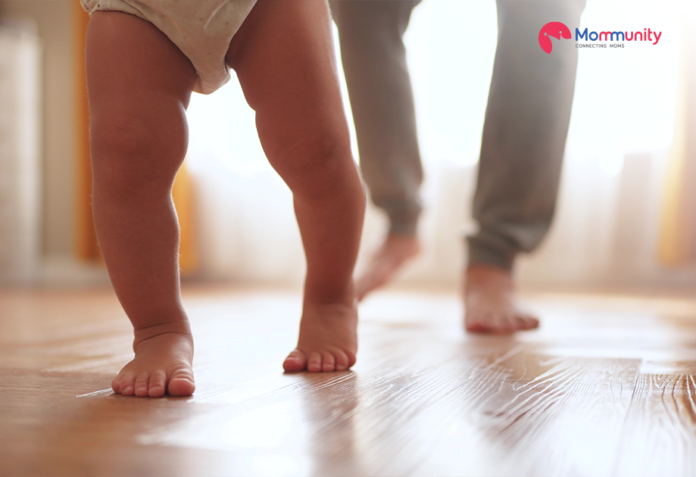|
Getting your Trinity Audio player ready...
|
Have you ever wondered when does baby start walking? Are you eagerly waiting for those first wobbly steps? The period of walking is one of the most significant milestones in a baby’s life, and it can be an exciting time for both the baby and parents. As a parent, you may have many questions running through your mind.
When does baby start walking? What are the signs that my baby is ready to walk? How can I encourage my baby to take those first steps? In this blog, we’ll answer these questions and provide you with all the information you need to know about the baby milestone of walking.
When Does Baby Start Walking?
Before toddlers start walking, they develop many skills, such as balance, coordination, standing up, and self-support. Each new skill helps them build strength and prepare for walking.
The baby takes its first steps between 9 and 18 months, although some may take them earlier and some later between 17 and 18 months, which is completely normal. According to medical research, it takes a certain amount of time to regain balance.
Besides this, the first moment you see your child take its first steps will always be remembered. Your child starts to walk in small steps, and this becomes the biggest milestone.
The following facts before the baby begin to walk are:
- 6 months– Baby begins to sit up on their own.
- 6-9 months– They will start crawling.
- 9 months– In order to stand, babies pull themselves onto furniture like a couch or coffee table.
- 9 to 12 months– Babies slowly start to stand up and hold onto furniture and other items.
- 11 to 13 months– During this breathtaking time, you can expect to see the baby’s growth independently.
Signs Of When Does Baby Start Walking
-
Pulling up
Pulling upon furniture is the first step of the milestone and also the first sign of learning to walk. Babies usually pull up to stand around the age of 7-10 months. To do these activities, infants use the sides of furniture, like a couch or coffee table, to pull up to stand.
This pulling up-to-stand technique often happens after babies learn to crawl or can sit unsupported. Many parents start noticing pulling activities in babies around 8 months, and it can last up to three months before they see their first walking steps.
-
Cruising
Cruising can be defined as when a baby grabs onto objects while walking. They might walk around the coffee table or couch or lean from one item to another to operate the space.
When a baby is comfortable and at ease with the “pulling up to stand” technique and learns to hold and balance on its own feet, it will start to step sideways while holding onto furniture, which can be called cruising.
It often occurs between the ages of 9 and 13 months. Place a couch, coffee table, or several strong chairs close together to practice safely. Be aware of sharp corners and edges of furniture for your child.
-
Put into practice of standing
A baby starts experimenting and practicing standing as part of pulling up to stand around 7-12 months, even if they stand for 2 seconds or fall before 2 seconds. This indicates and shows as a sign that they will start walking soon. Babies usually learn to stand independently between the ages of 10 and 16 months.
When your baby is able to stand alone comfortably for a more extended period of time, you will know that those first steps are just around the corner. Toddlers often start to walk on their own between the ages of two and three months after they can stand.
How To Motivate My Infant To Learn To Walk?
- Encourage them with toys
Inspire your baby to stand up by putting a toy within their reach, like the stainless steel jungle keys. As soon as the baby reaches the toy, hold onto it and move it into a shorter distance to see if your baby steps toward it. Try a little closer to see if they will take a step on their own.
- Arrange furniture
Place two pieces of furniture, such as a couch or any low table, parallel to one another and give enough space for your infant to crawl between them while gripping them. You can invite your infant to come and grab a toy or object by sitting or kneeling at the other end of the aisle from them.
- Go barefoot
Take your infant barefoot and let them play on the floor. This promotes healthy foot development and provides children with sensory feedback through their feet.
- Test your baby’s balance
Test your baby’s balance by turning her back to the sofa. See how your baby reacts in this position and keep the book out of his reach. Each time he is ready, he will lift his body off the cushion and stand alone.
Environmental Elements Influencing Brain Development
- Premature birth
- Infections or exposure to poison in the biological before birth
- Several problems that the mother goes through, such as high blood pressure, hemorrhage, and more.
- Head injury to the baby.
- Malnutrition includes vitamin K deficiency, rickets, beriberi, and more.
To summarize, babies take their first steps between the ages of 10 and 18 months, and this is completely normal as each baby develops at a different pace. You don’t need to stress much about when does baby start walking if your baby can’t walk by age one. Consult your pediatrician if your child is not yet able to walk independently at 18 months or is not yet taking their own steps.




